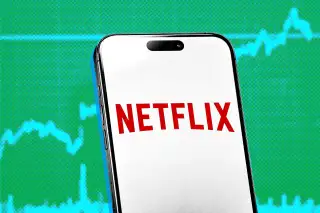Netflix Stock Split: Shares Are About to Get 10 Times Cheaper

Netflix is planning a 10-to-1 stock split in a move that would make shares easier to buy.
The streaming giant approved the measure on Thursday. Stock splits involve dividing up full shares by a ratio determined by the company, resulting in a lower price per share.
In Netflix's case, investors who own shares of Netflix stock will receive nine additional shares after the closing bell on Nov. 14 for each share held as of Nov. 10. The shares will begin trading with the split-adjusted price when the market opens on Nov. 17.
The 10-to-1 forward split does not change the fundamentals of Netflix in any way but is intended to make shares “more accessible to employees who participate in the [c]ompany’s stock option program,” Netflix said in a statement. Others will likely benefit, too, including existing shareholders and new investors who may find the barrier to entry significantly lower.
Following the stock-split announcement, Netflix share prices jumped as much as 4%, but they dipped back to pre-announcement prices of around $1,090 on Monday. Year-to-date, Netflix shares have popped about 23%.
Why do companies split their stock?
Netflix joins a long list of companies to have split their stock recently. Notably, Nvidia and Chipotle both split their stock last year. Netflix itself has split its stock twice before, in 2004 and 2015.
There are a number of reasons why companies split their stock this way, but the result is generally the same: lower-priced stocks that get a little easier to trade. Major companies sometimes do this after share prices exceed a big threshold, such as $1,000 per share.
Netflix, which went public in 2002 with shares at $15 apiece, crossed the $1,000 mark in April and has remained above it since.
“A psychological barrier might occur with trading high-priced shares,” FINRA, the self-regulatory agency, explains on its website. “A very high stock price can intimidate investors who fear there is little room for growth.”
Accessibility is another big motivator.
As fractional-share investing — which involves buying or selling portions of shares as opposed to whole ones — becomes more popular, stock splits have less of an impact on everyday retail investors because many can now invest at any price and receive fractional shares proportional to the amount invested. However, some trading platforms still have limitations on fractional shares.
For example, Ally Invest does not allow fractional-share trading, and E-Trade restricts direct fractional-share purchases. Bank of America’s Merrill Edge has restrictions, as well.
Assuming Netflix’s share prices stay stable for the next couple weeks, investors will be able to scoop up a full slice of the streaming company for around $100 a pop — regardless of how they trade.
More from Money:
We Asked ChatGPT and Gemini Which Stocks to Buy for November
Are U.S. Stocks Overvalued? Everyday Investors and Experts Disagree
Forget Stock Picking: 'VOO and Chill' Is Good Enough for This Money Writer